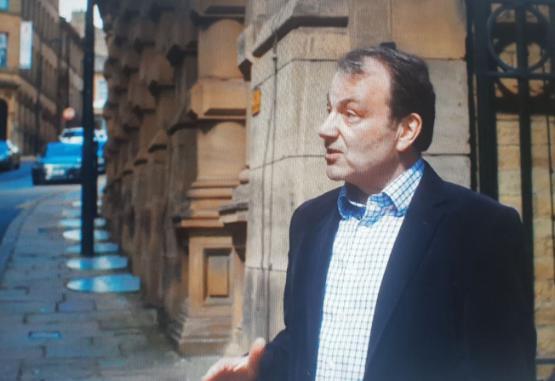Bradford’s heritage is a source of pride, says European history professor

Bradford’s bid for City of Culture 2025 is only strengthened by its cosmopolitan history and its industrial heritage, according to one Bradford historian.
Professor of Modern European History Munro Price, who came to the city 33 years ago and has been here ever since, made the remarks after appearing on Channel 5 documentary Walking Victorian Britain.
Prof Price teaches Modern International History as part of International Relations, Politics and Security Studies, delivered by the University of Bradford’s Division of Peace Studies and International Development, an internationally recognised centre for excellence in teaching, research, and policy engagement.
He is the author of numerous books, including Napoleon: The End of Glory (2014), The Perilous Crown (2007), and The Fall of the French Monarchy (2002).
He said: “Bradford has such a wonderful industrial and commercial history and it’s something we ought to be more proud of. The other point to note is that Bradford has always been a cosmopolitan city.
“I think there is a sense in some quarters that the city has an inferiority complex but it really shouldn’t. In its heyday, it was the wool capital of the world. It processed wool from Peru, Syria and Eastern Ukraine. It was a global city, and it attracted merchants from across the globe, including many from Germany, who came here because they saw a unique business opportunity. We see this today in the remarkable legacy of buildings, such as those in Little Germany.”
Past and future
Prof Price pointed out that many of the city centre’s most recognisable buildings echo its multicultural past. The town hall is modelled on the Palazzo Vecchio, Florence, while the Wool Exchange (where Waterstones currently resides), mirrors Doge's Palace, Venice.
“This incredible past was built on multiculturalism, and that is very topical, because it shows what can happen when people get along with each other, rather than the other way around, the consequences of which can be pretty awful.”
Prof Price said the Ukraine crisis showed why the University’s Division of Peace Studies and International Development - incidentally, the first in the world - and the history elements that are taught within it, was so important.
He added: “Coming here as a historian, I feel a real duty to tell people just how much Bradford has got going for it. And of course winning the bid for City of Culture 2025 would give us all a wonderful opportunity to showcase our fascinating cosmopolitan past and build on it for the future.”
